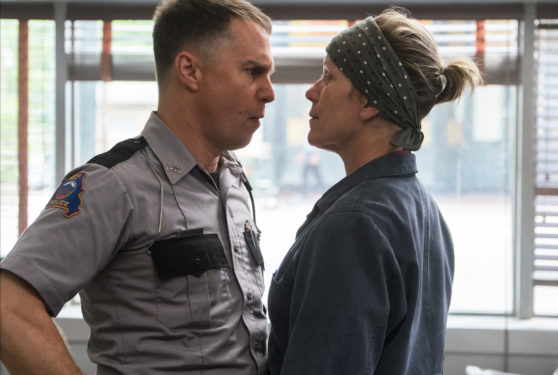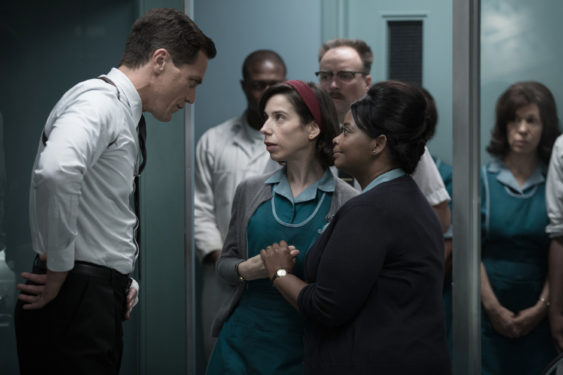By Steven Greydanus

On Sunday, March 4, the Academy of Motion Picture Arts and Sciences will most likely choose one of two darkly violent, misanthropic titles as the best picture of 2017.
In the running, but unlikely to upset, are a harrowing but humane and uplifting war film; a witty horror provocation satirizing the shallowness of conventional white liberalism; and a sensitive coming-of-age tale with an affectionately drawn Catholic backdrop.
Surging after recent wins at the British BAFTA Awards, Martin McDonagh’s “Three Billboards Outside Ebbing, Missouri” is a quirky tale starring Frances McDormand (the frontrunner for Best Actress) as a Midwestern mother who rents three billboards to shame the local sheriff for lack of progress in the case of her daughter’s horrific rape and murder.
“Three Billboards” has been embraced by some Catholics and other Christians for its overtly Flannery O’Connor–esque efforts to capture grace amid grotesquery. On the other hand, it’s earned criticism for its cruel treatment of female characters, its lack of perspective on its own theme of American racism, and its elevation of a character who commits suicide as the dispenser of divine wisdom to other characters.
The Frontrunner
The frontrunner for Best Picture is probably still Guillermo Del Toro’s acclaimed “The Shape of Water,” a visually dazzling fairy-tale romance period piece starring Sally Hawkins (in contention for best actress) as a mute cleaning lady who’s in love with a Black Lagoon-ish amphibious humanoid (Doug Jones).

It’s also a glib, complacent broadside against “The Patriarchy,” especially in its mid–20th century American form, with a privileged white male antagonist who embodies racism, sexism, fascism and homophobia – all sanctioned in his mind by a God whom he comes right out and says looks a lot like himself, less like Octavia Spencer (in the race for supporting actress), and not at all like the “freak of nature” he wants to dissect.
Running behind these two is the best of the nominated films, Christopher Nolan’s “Dunkirk” – the year’s grandest spectacle, a tour de force of visual storytelling, and a celebration of a spirit of solidarity much in need today.
An immersive composite triptych of the military crisis in the Battle of France that led to the “miracle” evacuation of more than 300,000 vulnerable troops, “Dunkirk” interweaves the desperation of the soldiers stranded on the beach in France with Tom Hardy’s aerial derring-do and Mark Rylance’s matter-of-fact civic virtue as one of countless British civilian sailors who put their boats or even their lives on the line to help bring the troops home.
Dark Horse Contenders
Also in contention is Jordan Peele’s “Get Out,” a witty horror provocation with elements of comedy and thriller, satirizing the shallowness of conventional liberalism of white elites.
Daniel Kaluuya (nominated for best actor) plays a black photographer named Chris who reluctantly joins his white girlfriend (Allison Williams) for a weekend visit to her parents’ estate. While he finds them predictably awkward in their attempts to tender their anti-racism bona fides (“If I could, I would have voted for Obama for a third term,” Dad confides), Chris soon senses something far more sinister at work.
Not entirely out of the running is the lightest and brightest of this year’s Best Picture nominees, Greta Gerwig’s “Lady Bird,” a semiautobiographical coming-of-age piece starring Saoirse Ronan (nominated for best actress) as a senior at a Catholic high school in Sacramento, Calif.
The film focuses on the protagonist’s turbulent relationship with her mother and her hopes of attending an Ivy League college in a cultured East Coast metropolis. Gerwig has called the film her love letter to Catholic education as well as her hometown, and if it’s a conflicted love letter, it’s sharply observed and attentive. When Sister Sarah Joan asks Lady Bird whether attention and love aren’t the same thing, she’s talking about Lady Bird’s writing, but also Gerwig’s film.
Among other Best Picture nominees, don’t miss Steven Spielberg’s “The Post,” starring Meryl Streep (an almost inevitable best actress nominee) and Tom Hanks. A terrific journalistic thriller, the film stars Streep as Katherine Graham, newspaper heiress and publisher of the Washington Post at the time of the Pentagon Papers leak.
With “Bridge of Spies” and “Lincoln,” “The Post” rounds out what could be called a Spielberg “American Civics Trilogy,” this one celebrating the importance of a free press in the face of government misconduct and intimidation.
Among the best 2017 films not in the race, Dee Rees’s haunting “Mudbound” surely would have scored a nomination had its distributor been a major Hollywood studio and not Netflix. At least Mary J. Blige was nominated in the best actress category, and Rachel Morrison’s rich if often bleak cinematography made her the first woman ever nominated in that category.
Adapted from Hillary Jordan’s novel about two families in 1940s Mississippi, divided by race but linked by geography and circumstance, the ensemble drama stars Blige and Rob Morgan as longtime tenant farmers working a cotton farm in the Mississippi Delta recently bought by a white couple, played by Carey Mulligan and Jason Clarke, who wind up living there. With shifting points of view and brilliant editing, it’s both literary and cinematic, epic and intimate, old-fashioned and utterly contemporary.
In other races, Gary Oldman is a virtual lock for his definitive performance as Churchill in the Best Picture nominee “The Darkest Hour,” which touches on the Dunkirk story from the other side of the Channel.
Best Documentary
“Faces Places,” an eccentric, delightful documentary/manifesto about noticing and celebrating overlooked people and fading ways of life, has as good a chance as anything at winning feature documentary.
Finally, while Pixar is sure to pick up yet another animated feature Oscar for “Coco,” a colorful Mexican-set land-of-the-dead fantasy with just enough Catholic iconography to make the dearth of real spirituality or hope of heaven irritating, the year’s best film is also in the running: Nora Twomey’s “The Breadwinner,” from the Irish animation house Cartoon Saloon (“Song of the Sea,” “The Secret of Kells”).
Based on the children’s novel by Deborah Ellis, “The Breadwinner” follows a young girl living in Taliban-era Afghanistan, under which women and girls may not move about without a male escort. It’s a powerful portrait of human cruelty seen through a child’s eyes – and a tribute to the resilience of childhood.
Steven Greydanus is a deacon in the Archdiocese of Newark, N.J., and co-host of “Reel Faith,” the film review show produced by and seen on NET-TV.
